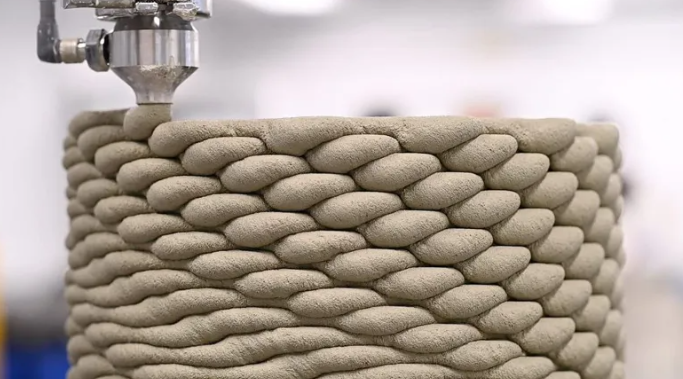Robotics and additive manufacturing produce tougher concrete
Crack resistance in concrete components can be improved by coupling architected designs with additive manufacturing processes and industrial robots that precisely control material deposition.
This is the claim of researchers at Princeton Engineering whose designs are said to have increased resistance to cracking by as much as 63 per cent compared to conventional cast concrete. The team’s work is described in Nature Communications.
The researchers were inspired by the double-helical structures that make up the scales of an ancient fish lineage called coelacanths. Research lead Reza Moini, an assistant professor of civil and environmental engineering at Princeton, said nature often uses ‘clever architecture’ to increase material properties such as strength and fracture resistance.
To generate these mechanical properties, the researchers proposed a design that arranges concrete into individual strands in three dimensions.
The design uses robotic additive manufacturing to weakly connect each strand to its neighbour. The researchers used different design schemes to combine many stacks of strands into larger functional shapes, such as beams.
The design schemes rely on slightly changing the orientation of each stack to create a double-helical arrangement (two orthogonal layers twisted across the height) in the beams that is key to improving the material’s resistance to crack propagation.
The paper refers to the underlying resistance in crack propagation as a ‘toughening mechanism.’ The technique relies on a combination of mechanisms that can either shield cracks from propagating, interlock the fractured surfaces, or deflect cracks from a straight path once they are formed, Moini said.
Shashank Gupta, a graduate student at Princeton and co-author of the work, said that creating architected concrete material with the necessary high geometric fidelity at scale in building components can require the use of robots. This is because it can be challenging to create purposeful internal arrangements of materials for structural applications without the automation and precision of robotic fabrication.
In Moini’s lab, researchers use large, industrial robots integrated with advanced real-time processing of materials that can create full-sized structural components that are also aesthetically pleasing.
As part of the work, the researchers also developed a customised solution to address the tendency of fresh concrete to deform under its weight.
When a robot deposits concrete to form a structure, the weight of the upper layers can cause the concrete below to deform, compromising the geometric precision of the resulting architected structure.
To address this, the researchers aimed to better control the concrete’s rate of hardening to prevent distortion during fabrication.
They used an advanced, two-component extrusion system implemented at the robot’s nozzle in the lab, said Gupta, who led the extrusion efforts of the study.
The specialised robotic system has two inlets: one inlet for concrete and another for a chemical accelerator. These materials are mixed within the nozzle just before extrusion, allowing the accelerator to expedite the concrete curing process while ensuring precise control over the structure and minimising deformation.
By precisely calibrating the amount of accelerator, the researchers gained better control over the structure and minimised deformation in the lower levels.
Source: https://www.theengineer.co.uk/content/news/robotics-and-additive-manufacturing-produce-tougher-concrete
Acres have a range of standard products but also support clients with custom machinery and medium-high volume products such as trolleys, stillages etc.
We have manufactured lots of different tables / workstations / workbenches for various industries.
We also manufacture access platforms, jigs and fixtures and many other types of production support solutions / products.
Talk to us today about your requirements: [email protected] / 01332695240 / Contact Us Form
Click on the icon to check out our social media! Please follow, like and share!
Want to know more about Acres Engineering?
We are based in the UK from our Headquarters in Derbyshire, England and have a European office in Malaga, Spain within the EU.
Find out more about where we have been and what we have been up to by checking out our latest blog posts.
Take a look at how we support of the Armed Forces, STEM/Schools and Charities.
As a world leader in our field, we offer a range of information guides sharing best practice with our clients.
We make it easy to engage with us, we are approved on: EcoVadis (external) / JOSCAR (external) / AVETTA (external) / COUPA (external) / SAP ARIBA (external) / DEEPSTREAM (external) ….you can download our BSI / Insurance certificates here.




![]()
![]()
![]()
Source: TheEngineer.co.uk






